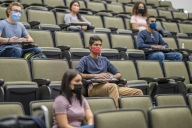You have /5 articles left.
Sign up for a free account or log in.

Istockphoto.com/fpm
National Federation of the Blind: Don’t Make Online Accessibility an Afterthought
March 16, 6:15 p.m. The National Federation of the Blind is urging schools and colleges not to forget their legal obligation to make learning content accessible to all students as they rush to move courses online in response to the spread of COVID-19.
In a blog post today, Stephanie Flynt, government affairs specialist at the National Federation of the Blind, wrote that blind students “risk having their ongoing educational needs swept under the rug” as many institutions prepare to cease in-person instruction.
“Over the past two decades, we know the 21st century interactive classroom has dramatically evolved, but we also know the accessibility of instructional materials has continued to be viewed as an afterthought,” Flynt wrote. “The solutions exist, but must be prioritized.”
The National Federation of the Blind has compiled a series of accessibility resources for educators and is monitoring accessibility barriers through an education technology survey. Readers are invited to participate in an #AccessibleNOW Twitter chat on Friday, March 20, at 12 p.m. EST.
-- Lindsay McKenzie
Leader of Calif.'s Two-Year Colleges: Response to Virus to Last Through June
March 16, 5:00 p.m. Eloy Oakley, chancellor of California's community college system, said Monday that the system's response to the coronavirus outbreak likely will last through June, reported Mikhail Zinshteyn, a California-based education reporter.
Oakley was speaking at a hearing. He said the state's two-year colleges should "plan for a second peak of the virus sometime around August or September."
The governing board for the system gave Oakley emergency powers for 180 days. He now can override existing local and state rules governing California's community colleges.
The system, which enrolls roughly 2.1 million students at 115 colleges, last week announced a move to online instruction. Oakley also said the colleges should cancel, postpone or move online all commencement ceremonies that are scheduled for May and June.
-- Paul Fain
Northwestern to Reschedule Gathering of College Presidents From Around the World
March 16, 4:44 p.m. A summit of university presidents from around the globe that had been scheduled for early June has been postponed as COVID-19 spreads.
Dozens of presidents were expected to attend the U7+ Summit at Northwestern University. The gathering was intended to help university leaders “play a leading role in addressing critical global challenges” like climate, inequity, polarization, technological transformation and community engagement.
Postponing the gathering will allow leaders to focus on issues at home, according to a Northwestern news release. The event will be rescheduled, it said.
“We are deeply committed to working across institutional and geographic boundaries to address our greatest global challenges,” Northwestern’s president, Morton Schapiro, said in a statement. “However, the health and safety of our academic and global communities is of paramount importance at this time, necessitating a postponement of the U7+ Summit.”
In addition to Northwestern hosting the event, Columbia University, Georgetown University and the University of California, Berkeley, are listed as co-sponsors. Representatives from more than 50 universities were invited.
-- Rick Seltzer
Colleges Begin Canceling Commencement Ceremonies
March 16, 4:18 p.m. The University of Michigan on Friday became one of the first U.S. institutions to cancel spring commencement ceremonies.
Many other colleges and universities have said they will decide on commencement later. But that may be changing Wednesday, as several colleges have made the call to cancel the events.
Howard University, Kansas State University, Wentworth Institute of Technology and Kellogg Community College were among institutions to announce that commencement was canceled or postponed.
Kellogg, located in Michigan, cited federal guidelines recommending against larger gathering of people.
“We are in unprecedented times and we are taking unprecedented measures as an institution to prevent exposure to the coronavirus that is rapidly spreading in Michigan and around the world,” Adrien Bennings, president of KCC, said in a statement. “We are disappointed that we won’t have the opportunity to celebrate our Bruins’ success by handing them a diploma as they walk across the stage to the applause of their family and friends, but we will find some other way to recognize their accomplishments.”
-- Paul Fain
In Reversal, LA Community College District Suspends All Classes
March 16, 2:15 p.m. The Los Angeles Community College District announced the suspension of all classes, both online and in-person, beginning today and going through March 29.
The governing board for the district, which enrolls roughly 230,000 students, made the decision after initially planning to move to online class delivery after canceling classes for the first two days of this week. The district had said the two-day pause would be used to train faculty members to access and teach in the online platform.
But after an emergency meeting over the weekend, the board instead opted to suspend all classes and in-person services at the colleges until the end of the month.
“There is nothing more important to me and to my board colleagues than the safety of our students, staff and faculty. This was a difficult decision to make, but it was the right one that provides protection and stability during these challenging times,” Andra Hoffman, the board's president, said in statement.
-- Paul Fain
Some International Applications Soaring to University of the People
March 16, 2:04 p.m. The online nonprofit University of the People reports a huge spike in global applications in response to the coronavirus.
“We are seeing an enormous jump in numbers of applications and interest from areas highly affected by the coronavirus, from students whose schools may have shut down or who may be in quarantine themselves,” Shai Reshef, president of the University of the People, said in an emailed statement.
“We are happy to accommodate these students affected by mounting health concerns,” he said.
The university, which is a tuition-free, accredited American university, received 300 applications from students in China during the winter term from October to December 2019. So far this term, which started Jan. 1, the number of applications from China has tripled.
Web traffic from Italy, Japan and South Korea -- all countries badly impacted by the pandemic -- has also doubled in recent months.
-- Lindsay McKenzie
College Board, ACT Reschedule Exams
March 16, 12:19 p.m. The College Board and ACT have rescheduled upcoming exams.
The SAT of May 2 has been canceled. Makeup exams for the March 14 SAT, scheduled for March 28, have also been canceled "in response to the rapidly evolving situation around the coronavirus (COVID-19)."
Students who had been registered to take the SAT on one of those days will receive refunds.
At this point, the next SAT that has not been called off is June 6.
ACT has rescheduled the April 4 exam, moving it to June 13 "in response to concerns about the spread of the coronavirus (COVID-19)." In the next few days, everyone who registered for the exam will receive information about the new date.
The College Board gave the SAT on Saturday, although many test sites were closed.
-- Scott Jaschik
Census Bureau Shares Information on Counting On-Campus Students Who've Been Sent Home
March 16, 12:12 p.m. The U.S. Census Bureau is addressing some operations that count college students.
College students who live on campus are counted through their colleges or universities as part of a census operation that counts students in university-owned housing and other group quarters like nursing homes, halfway houses and prisons. That could get a little more complicated with so many campuses sending students home.
A little more than half of student housing administrators had been planning to respond to the census in a method that provides the Census Bureau with directory information about students. Another 35 percent had been planning to allow students to self-respond with individual questionnaires.
The Census Bureau is contacting those institutions allowing self-responses to ask if they’d like to change those plans.
Generally, students in colleges that are temporarily closed because of the outbreak will still be counted under the same processes as before.
“Per the Census Bureau’s residence criteria, in most cases students living away from home at school should be counted at school, even if they are temporarily elsewhere due to the COVID-19 pandemic,” said a Sunday afternoon news release from the Census Bureau.
In other words, even if students are home on the official census day, which is April 1, they should be counted based on where they live and sleep most of the time. The Census Bureau says it is asking institutions to contact students with reminders about responding.
-- Rick Seltzer
Guidance on International Students and Online Courses
March 15, 10:21 a.m. The Department of Homeland Security’s Student and Exchange Visitor Program (SEVP) has published more detailed guidance on how it will offer flexibility in relation to rules that typically restrict international students from counting more than one online course toward the requirement that they maintain a full-time course of study.
The guidance, published Friday, addresses three scenarios: one in which a school closes temporarily without offering online learning instruction, one in which a college temporarily switches to online instruction and the international student remains in the U.S., and one in which a college temporarily switches to online instruction and the international student leaves the country.
In the first case -- in which a college closes -- the Homeland Security Department said institutions should keep international student records active in the federal Student and Exchange Visitor Information System (SEVIS) so long as students intend to resume their course of studies when classes start up again, just as they would for regularly scheduled academic breaks.
For the other two cases, in which institutions switch to online instruction, SEVP said it will temporarily waive restrictions on international students engaging in online coursework. Students’ SEVIS records should stay in active status if they continue courses online whether they are inside or outside the U.S.
SEVP stressed that the measures are temporary and that guidance is subject to change. Colleges must notify SEVP of procedural changes they make to respond to the coronavirus within 10 days of making those changes.
-- Elizabeth Redden








